
Aviad Moshe in the Beer Sheva District Court
(Photo: Haim Hornstein)
Innocent, he tried to portray himself as a victim and avoided clear answers about the assault that almost ended in murder: His first testimony in his trial was opened by Aviad Moshe, who, according to the indictment, tried to murder his ex-wife, Shira Isakov, with an apology. Immediately afterwards, and for four hours, he tried to present himself as a victim, avoided talking about the assault, stuttered, cried and even claimed to be the one who was beaten during the marriage. The judges in the Be’er Sheva District Court interrupted him when he avoided an accurate description of the attack: “What went through your mind? You did not explain anything to us,” “You speak in slogans, everything is vague.”
The plaintiff, Adv. Moran Gaz, presented Aviad Moshe with the blood-stained rolling pin, which changed its color from wood to black and cracked from 110 blows, and the blood-stained knife with which he stabbed Shira 20 times.
6 View the gallery
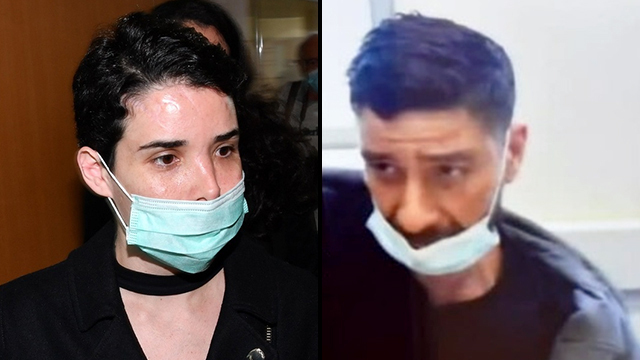

The beating husband tried to present himself as a victim. Aviad Moshe in court and Shira Iskov as photographed in the previous hearing
(Photo: Haim Hornstein)
6 View the gallery
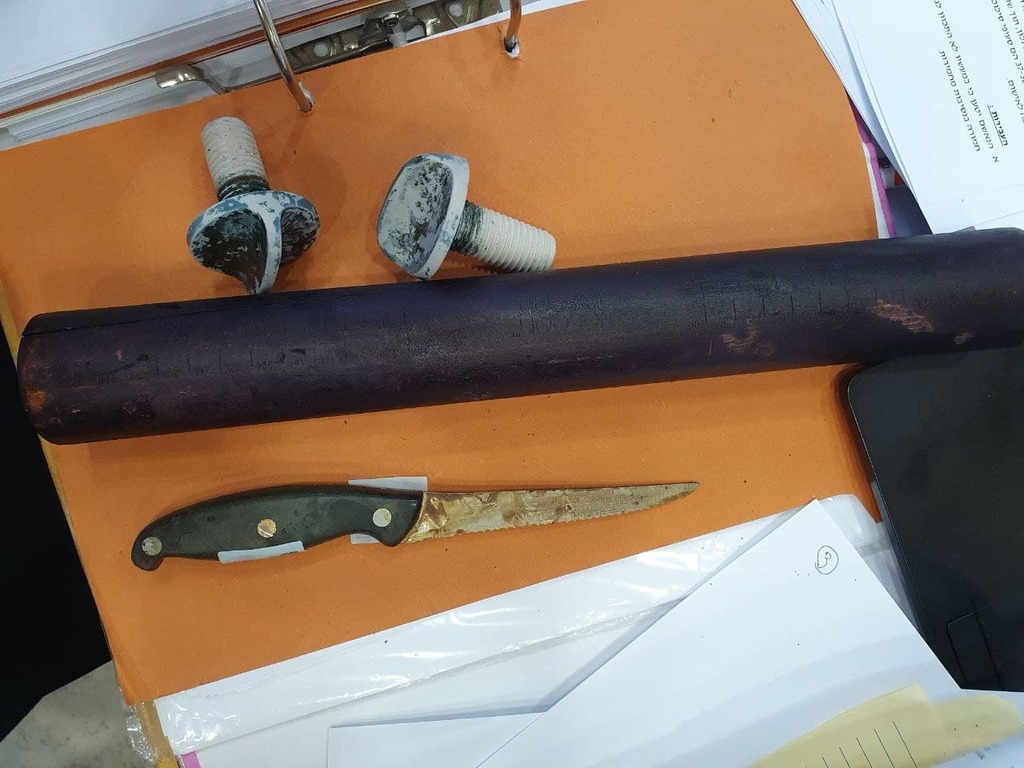

Means of attack: the color-changing rolling pin and blood-stained knife
6 View the gallery
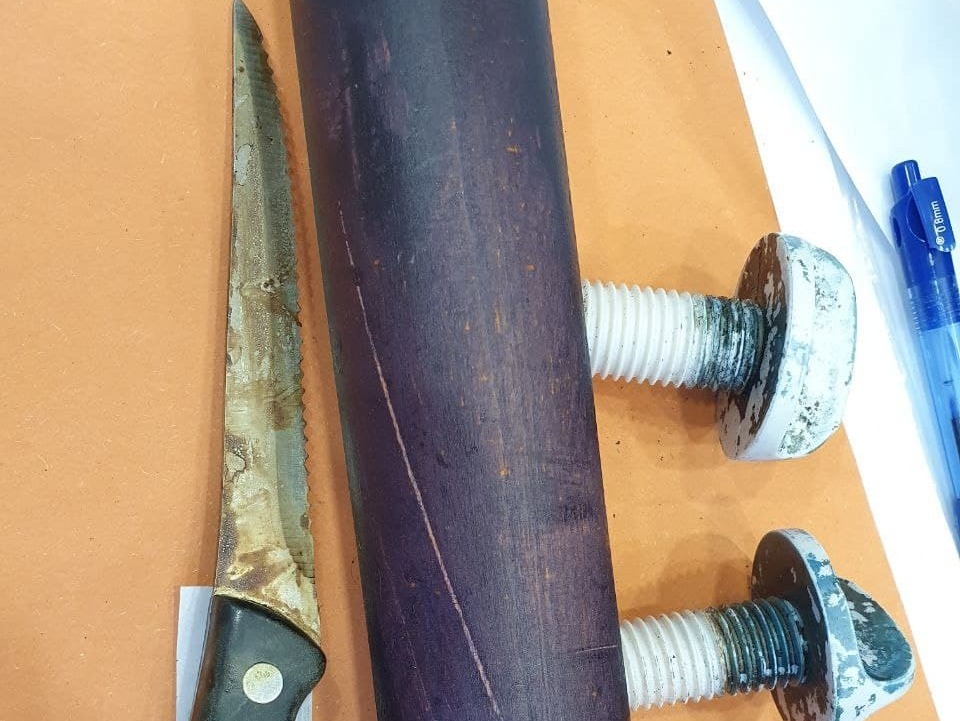

6 View the gallery
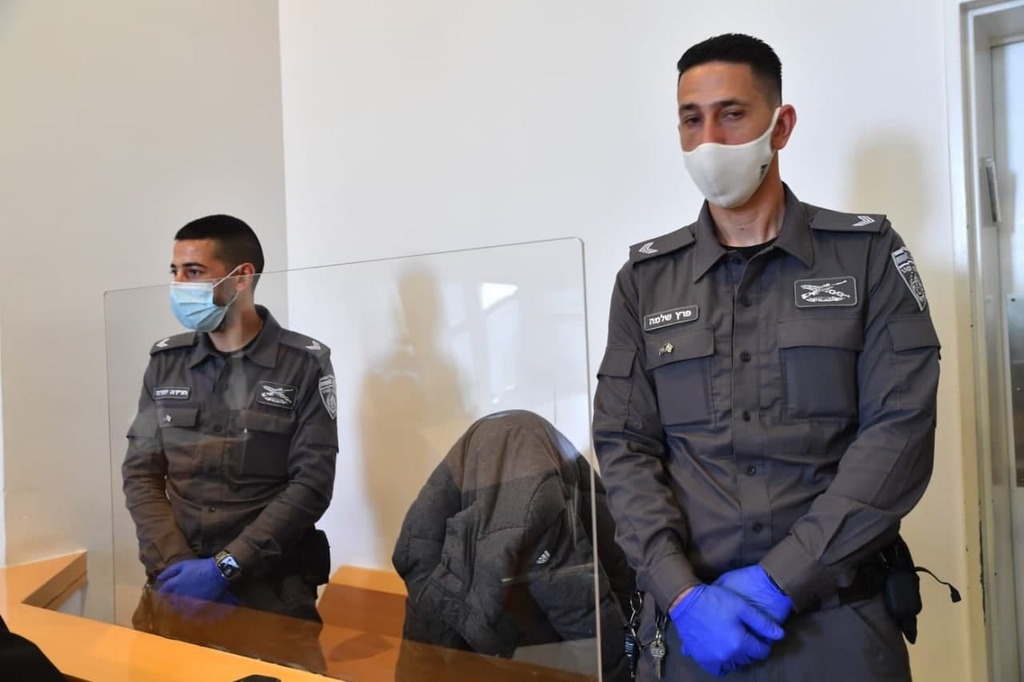

Aviad Moshe in court
(Photo: Haim Hornstein)
Moshe, who beat Iscove with a rolling pin and stabbed her 20 times last New Year’s Eve, appeared on the witness stand in the Be’er Sheva District Court for the first time today. Moshe’s defense attorney, Adv. Alon Davidov of the Public Defender’s Office, opened Moshe’s main testimony: “Indian at the incident. But there are some controversies and we would like to hear what you have to say about these things. The main thing they claimed is that you never had in your heart the decision to kill Shira. And you did not tell her ‘I will die already’. The court needs to know the circumstances surrounding the incident and your testimony focuses on these things. “Attorney Davidov asked Moshe to describe the events that preceded the attack.
Aviad described in his testimony the deterioration in their relationship after the abortion that Iskov underwent, claimed that she was angry with him and behaved in an abusive manner towards him. He further claimed that he spat at him and that she had previously attacked him and claimed to the police that he had assaulted her. As you may recall, there is a complaint against Moshe to the police for attacking Shira, but in the end no proceedings were taken against him. He described the day he attacked her as a “damn day.”
Moshe tried to present Shira as an irrational woman, without self-control, who verbally attacked him until he could not contain her grievances against him. He claimed that at one point he even decided to record it to document the things she told him. Throughout the testimony Moses spoke in a calm and quiet voice, but each time things got to the attack itself he moved in other directions and sought gentle words to embellish his hard deeds. Speaking of the day of the incident, he claimed that he “lost it” when Iscov intended to take the child and drive to Carmiel, then looked down and began to cry. From that moment on, whenever asked about the assault he avoided describing it, stammering and looking for words that would get him out better.
6 View the gallery
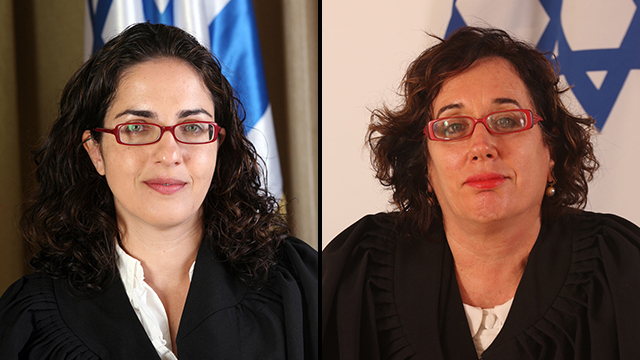

No assumptions were made for Moshe. Judges Raz Levy Yael and Gilat Shalev
(Photo: Spokeswoman for the Ministry of Justice, Spokeswoman for the Judiciary)
6 View the gallery
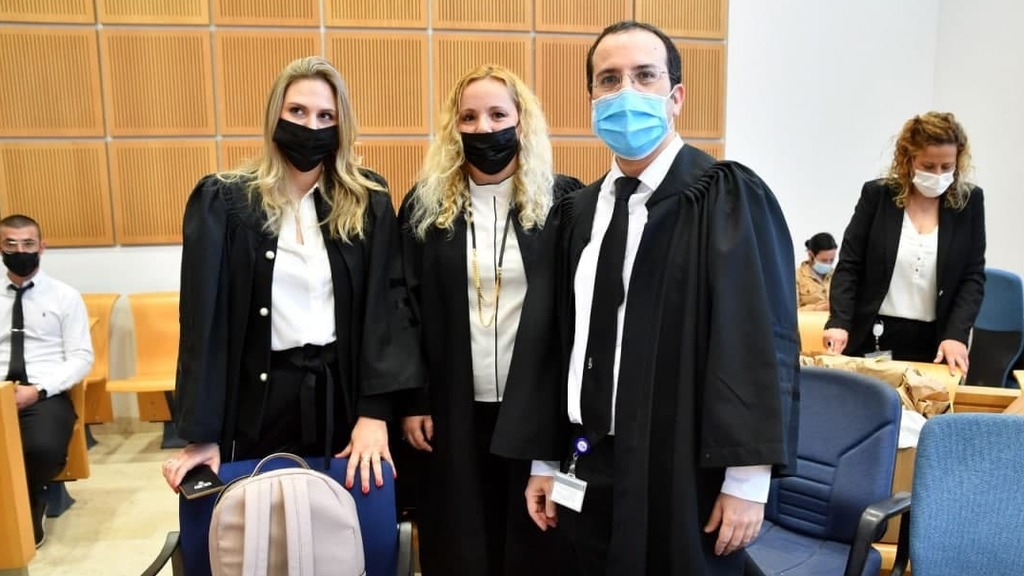

The prosecution team in court. Prosecutor Moran Gaz (in the middle of the photo) presented the means of attack
(Photo: Haim Hornstein)
In the testimony, Moshe tried to present himself as a warm and loving and caring husband, and even described how he picked flowers for singing. “Again an argument broke out, wishing my sisters to die. She said I would put the flowers in their grave. From here it deteriorated to a situation where I told myself I had to record it to protect myself.”
At this point, Judge Yael Raz Levy asked him: “From her face?”.
Moshe replied: “Yes. We went into the house and still all the tension was in the house. I sat in the living room and she threw things at me. She cleared her throat and gave me a spit and all my face was saliva and phlegm. From that point I just decided I was recording it.”
On the day of the attack, Moshe said: “Shira suddenly decided that she wanted to go to Carmiel. I grabbed her and told her, ‘Calm down already, you must stop doing this. Stop behaving like this all the time and swearing, the holiday is coming soon, it’s impossible like this.’ Travel, she started doing it quickly while packing toys and saying horrible things like ‘you will not be the father of the child, he will have another father’ “.
“At first I hid her bag under the bed,” Moshe claimed. “I wanted to try to calm her down, I explained to her that we were under closure and the trip from Mitzpe Ramon to Carmiel takes three and a half hours. I explained to her that she was not in the mood to travel. It did not help, she was not with me and started moving towards the door. I blocked her and told her that if she wanted, “Without the child. And that’s where I lost it,” Moshe concluded, looking down and starting to cry.
Moshe’s defense attorney asked him what caused his reaction, and it went on to claim that he was the victim himself – even though he attacked Iscove and almost caused her death: “It’s hard to explain. A burst of teasing, teasing and provocation. Maybe the threats she will take my child and another father will raise him. “He crushed me. I can’t explain what it did to my body.”
Iscov in the Be’er Sheva District Court last month
(Photo: Roi Idan )
After Moshe described in detail the things that preceded his claim to the attempted murder, but chose not to talk about the assault, he claimed: “God forbid, I did not make a decision to kill Shira, I would not dare harm her. I never, until the incident, raised a hand against her.” Judge Yael interrupted him: “When I hear the testimony, I do not understand what you are apologizing for. If we had stayed in ‘I never raised a hand’ we would not have had this case. It is said that a decision in your heart to kill her that day – I want to understand what was Your intent. ”
Judge Gilat Shalev added: “You said you never raised a hand, but the indictment says you attacked her in three stages, so ‘never’ fits here. They ask what went through your mind. What went through your mind when you attacked her with a rolling pin and a choke?”. Judge Raz Levy then added: “To say ‘I lost it’ is to say ‘I am not responsible’. You say mercy and peace. Your actions and the consequences are quite serious. I was taught that based on the actions one learns about intention.”
In the cross-examination, the plaintiff, Adv. Moran Gaz, attacked Moshe: “How can you say that you only intended to injure? If even you can not explain to yourself, how do you explain to the court? “. He replied:” Who said I meant to injure? I have to take responsibility for the actions. “She slammed him in response:” Get up and thank like a man, do not blame your wife who had 20 percent to live and that all the contents of her stomach and head were scattered on the floor. “Don’t say ‘she threw me the flowers’ like a little boy.”
Moshe replied: “Too bad you paint the picture that it’s the flowers. It’s an accumulation of teasing and violence, two weeks of accusations, cursing and teasing. Tell me I’m not going to be my son’s father?”
A report on Iscove’s testimony last month
(Photo: Roi Idan, Meshi Ben Ami)
Moran Gaz also referred to Moshe’s claims that he did not attack Shira the last time she complained against him, while living in Tel Aviv. “She had an injury to her chin, arms, elbow and shoulder. Where did those injuries come from? There’s not a single picture of injuries to you.” He replied, “I think I did have signs,” and she continued, “I show you pictures of poetry after the incident. It also happened after you defended yourself against it?”. He replied: “I think she said I lifted her. I will not mention her weight, but I do not think I can swing a man like that and flip. Her mother would not let it happen, she would shout and stop it.”
The prosecutor slapped Moshe with pictures of Shira after the attack in Mitzpe Ramon, the fact that he attacked her in front of their common son and almost murdered her, and he continued to approach them. The more she verified him with the fact that his son had seen the whole incident, the more he continued to provide vague answers, until Judge Gilat Shalev attacked: “I feel you are speaking in slogans, it’s terribly difficult for me. “Shira said. You say ‘I do not know, which, I wish.’ We can also say.”
The judges and the prosecutor tried to get Moshe to talk again and again about the attack itself, but each time he went round and round and just said that “something got into me there, a storm of emotions, an inner urge.”
When Moshe said “I wish the child was not at the incident”, the prosecutor replied: “You were there and heard him screaming”. At this point Moshe tried to reconcile what he was doing with the things Iscove said: “He started crying and shouting even before. As soon as she said goodbye to Dad he started crying and screaming. It is an unpleasant event.”
The plaintiff showed Moshe the rolling pin with which he attacked Shira, and showed him that he changed his color from wood to black after 110 strokes. She also presented him with the knife with which he stabbed Shira. At this point his memory would deceive him again. Aviad said he does not remember saying to Shira I will die already. “I do not deceive or approve. I refer you to the recording.”
The gas attorney commented: “Your actions were characterized by cruelty,” and Moshe responded: “The act is serious. The act is cruel.” The prosecutor added: “Doesn’t it seem cruel to you to leave the child in his mother’s blood? In these pauses when you opened the door and took a knife you could not take the child.”
Judge Raz Levy: “You said the suffocation you do not remember. You had a thought in your head that he is there when things happen. What did you think of yourself?”.
Moshe: “I do not know. I wish I knew he was there. As a result of loss of control.”
The prosecutor: “How in response to the indictment do you say that you hugged the child at her request, if you did not notice that he was there?”.
Judge Gilat Shalev: “Didn’t you hear the boy’s screams?”.
Moshe: “No. I also do not think I hugged him. I come back to me.”
The prosecutor commented that “this is not one incident of madness. The neighbors said you looked calm. When you talk to them you say ‘I am calm, I am calm.’
Moshe: “I said it more than twice. I do not know how I behaved. I can not explain it.”
Judge Raz Levy made it difficult: “We have to decide in the end. The main issue and you do not answer it. You say ‘I do not know anything, say what I did’. There is a recording where you are heard functioning and talking. I’m going to do it. There’s times it’s a split second. It’s been a long time here. You had others say ‘Stop it.’ You kept going. How did you explain it? You were there. If you meant you did not mean to kill her. Try to answer it. “Remember what was. To testify to what was.”
Moshe stammered again: “I try every day and think that even after the trial it will accompany me. A kind of inner urge that I can not explain. I can not understand it … you do not know what happened at that moment.”
Iscove, who as mentioned was not present in the testimony of her ex-husband, described in the previous hearing how he used physical violence when they were married. While Moshe was in the courtroom and heard the testimony, Iskov recounted, among other things, the damage done to her and her son: “My whole head stitches, and I have a lot of pain. The eye socket is broken and the cornea is damaged. I take painkillers. The cheek will heal on its own. The jaw. The broken teeth. “I have surgery to have a jaw bone graft and then a dental implant. I am learning cardiopulmonary endurance so I can go back to running and walking. A broken hand and a severed finger. I am in physical therapy. Twice a week I take the child for treatment, to a communication clinician. After the incident he stopped talking.”
In the cross-examination in the previous hearing, Moshe’s defense counsel presented, among other things, correspondence that focused on Iscov’s arguments with Moshe’s family members. Defense attorneys tried to show in court that Iscove took an active part in the arguments, in part to show that Iscove influenced his mindset against her, and that he was actually trying to calm the argument between them and did not intend to murder her.
The trial began in November, after the prosecutor’s office filed an amended indictment against Moshe for attempting to kill Iscove on New Year’s Eve and abusing their toddler son who witnessed the case. According to the indictment, Moshe hit her with a rolling pin, strangled her and stabbed her about 20 times with a serrated kitchen knife.
In case a woman in your area is in a violent relationship, refer her or call the Ministry of Welfare’s emergency number at 118 or 077-9208560. The center is staffed 24 hours a day and provides service in Hebrew, Arabic, Russian and Amharic.

